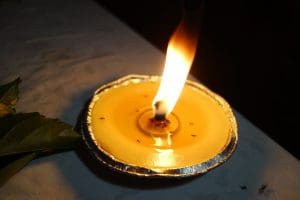Flies. Just the word can evoke a sense of irritation for most people. They are the uninvited guests at every outdoor gathering, the persistent buzz around your barbecue feast, and the unwelcome diners at your meticulously prepared meals. Beyond mere annoyance, some flies, like mosquitoes (often mistakenly grouped with flies), can inflict itchy bites, further dampening our outdoor joys. So, the persistent question remains: What Deters Flies effectively? How can we reclaim our homes and outdoor spaces from these common household pests?
Natural Fly Deterrents: Keeping Your Home Fly-Free
Flies are more than just a nuisance; they pose a genuine health risk. These insects can carry a multitude of bacteria and pathogens, potentially leading to food poisoning and even respiratory infections. Therefore, understanding what deters flies and implementing effective fly control measures is crucial for maintaining a healthy home environment.
Fortunately, the answer to “what deters flies?” isn’t always harsh chemicals. There are numerous natural methods to keep these pests at bay. Let’s explore these natural strategies to ensure your home remains a fly-free zone.
1. Prevention: The First Line of Defense Against Flies
Before diving into specific fly repellents, it’s essential to understand preventative measures. These simple, common-sense practices can significantly reduce fly breeding and population growth around your home. Essentially, we are removing the things that attract flies in the first place.
- Cleanliness: Eliminating Fly Food Sources
What truly deters flies? The absence of food! Flies are attracted to decaying organic matter, spills, and food scraps. Maintaining cleanliness, especially after outdoor gatherings or barbecues, is paramount. Promptly cleaning up any dropped food eliminates potential fly food sources. Equally important is proper waste management. Securely sealing rubbish bags and ensuring rubbish bins are tightly closed prevents flies from accessing and breeding in waste.
- Lighting: Minimizing Attraction
Light, particularly white bulb lights, acts as a powerful attractant for many insects, including flies. This is because many insects are drawn to light sources, especially at night, for navigation or other reasons. Dimming outdoor lights during evening gatherings and opting for yellow-toned bulbs can significantly reduce fly attraction. Yellow bulbs and sodium vapor lights are less attractive to insects. Furthermore, avoiding leaving outdoor lights on all night minimizes the draw for flies and other nocturnal pests. This simple change in lighting strategy is a key element in what deters flies from congregating around your home at night.
 Step 1- Start With Prevention (How To Keep Flies Away From Home)
Step 1- Start With Prevention (How To Keep Flies Away From Home)
Alt text: Yellow outdoor bulb illuminating a patio at dusk, illustrating how yellow lighting deters flies compared to bright white lights.
2. Harnessing Natural Fly Repellents
Even with meticulous preventative measures, flies can still find their way into your home and patio. This is where natural fly repellents become invaluable. These solutions leverage substances and scents that flies instinctively avoid, answering the question of “what deters flies?” with natural power.
From homemade sprays to strategically placed herbs and plants, and even some unexpected household items, we’ll explore a range of natural repellents. These methods provide effective fly control without resorting to harsh chemicals, perfect for a family-friendly environment.
Natural Sprays: Liquid Fly Deterrents
- Hydrogen Peroxide: An Oxidative Deterrent
What deters flies in hydrogen peroxide? It’s thought that the oxidative properties of hydrogen peroxide are irritating or unpleasant to flies. Creating a simple spray by mixing ⅓ hydrogen peroxide with ⅔ water in a spray bottle offers a powerful fly repellent. Shake the mixture well and spray it on surfaces where flies frequently land or linger. This simple solution can work surprisingly well to deter flies from treated areas.
- Vodka: An Unpleasant Inebriant for Flies
It might seem surprising, but vodka is among the things what deters flies. Flies and mosquitoes are not fans of the scent of vodka, or perhaps the alcohol itself is irritating to them. To create a vodka-based repellent, combine 1 glass of vodka, 2 teaspoons of aloe vera juice, 1 teaspoon of eucalyptus oil, and ½ teaspoon of essential oil. The aloe vera and essential oils enhance the repellent properties and add a more pleasant scent for humans.
Mix these ingredients thoroughly and pour them into a spray bottle. This mixture can be sprayed around areas where flies are a problem, or even used as a personal insect repellent. If applying to skin, always test a small area first to check for any skin irritation.
- Mouthwash: Minty Fresh Fly Repellent
Alcohol-based mouthwash is another unexpected answer to “what deters flies?”. Flies dislike the strong, often minty, scent of mouthwash, and the alcohol content may also play a role in repelling them. Simply fill a spray bottle with alcohol-based mouthwash and spray it on surfaces like table and chair legs, or any patio surface where flies gather. This method not only repels flies but also leaves a fresh, minty aroma in your outdoor space.
- Anise Oil: A Potent Herbal Deterrent
Anise oil, derived from anise seeds, possesses a strong, sweet, licorice-like scent that is pleasant to humans but highly offensive to flies. This potent aroma is key to what deters flies when using anise oil. To create an anise oil repellent, mix a few drops of anise oil into a spray bottle filled with water. Shake the mixture well and spray it in outdoor areas and on surfaces where flies are a problem. Its strong scent makes it an effective area repellent.
- Essential Oils: Concentrated Natural Repulsion
Essential oils are concentrated plant extracts, and many possess strong scents that are known to repel insects. Citronella is a well-known example, and yes, citronella does repel flies. For a powerful essential oil blend, combine approximately 150 ml of witch hazel in a spray bottle with 5 drops each of citronella, eucalyptus, and lavender essential oils. Witch hazel acts as a natural dispersant and skin-friendly base. Mix thoroughly before using this potent bug-repellent spray. The combination of these oils creates a broad spectrum repellent effective against various flying insects.
- Lemongrass Oil: Citrusy Pest Control
Lemongrass oil offers a refreshing, citrusy aroma that humans find appealing, but flies find highly undesirable. This strong citrus scent is what deters flies when using lemongrass oil. Create a lemongrass oil repellent by mixing 20-25 drops of lemongrass essential oil with half a cup of hot water. The hot water helps to disperse the oil. This mixture creates a potent bug repellent with an intense, citrusy aroma, ideal for keeping pests at bay while simultaneously freshening your home environment.
 Step 2- Use Natural Sprays That Repel Flies (How To Get Rid Of Flies)
Step 2- Use Natural Sprays That Repel Flies (How To Get Rid Of Flies)
Alt text: Assortment of natural fly repellent sprays in bottles, showcasing various DIY solutions to deter flies using household ingredients and essential oils.
Herbs: Nature’s Fly Repellent Plants
Certain herbs and plants contain volatile organic compounds (VOCs) that emit scents flies find repulsive. These natural scents are key to what deters flies when using herbs as repellents. Many of these herbs are pleasantly aromatic to humans, and some are even culinary staples.
Planting these herbs in pots near doorways creates a natural barrier, deterring flies from entering your home. Alternatively, planting them outdoors allows you to enjoy fly-free outdoor dining and relaxation. For those without gardens or living in apartments, dried basil and mint can also be effective. Place dried herbs in small bags and hang them indoors or outdoors to release their repellent scents.
- Peppermint: Intense Freshness Flies Hate
Peppermint’s strong, fresh scent is overwhelmingly offensive to flies. This intense aroma is what deters flies when using peppermint. Peppermint is exceptionally effective due to its high concentration of menthol, a compound flies strongly dislike. It’s also a relatively low-maintenance and attractive herb to grow, making it an excellent addition to your home and garden for natural fly control.
- Lemon Balm (Horsemint): Citrus Powerhouse
Lemon balm, also known as horsemint, emits a robust citrusy scent that is even stronger than some citrus fruits. This powerful citrus aroma is what deters flies from lemon balm. It is incredibly easy to grow, requiring minimal care, even less than peppermint, making it a convenient and effective natural fly repellent plant.
- Citronella Grass: The Classic Repellent
Citronella grass is renowned for its fly and mosquito repelling properties. Citronella for flies is highly effective due to its citronellal and geraniol content, compounds that are potent insect repellents. However, citronella grass is sensitive to cold and requires ample sunlight (around 6 hours daily). It’s the primary ingredient in many commercial mosquito repellents, highlighting its effectiveness in what deters flies and other insects.
- Basil: Culinary and Pest-Repelling Power
Basil boasts a strong, fresh, and slightly sweet aroma that is pleasant to humans but repels flies and mosquitoes. This aromatic strength is what deters flies in basil. Beyond its pest-repelling qualities, basil is a culinary favorite, perfect for cooking and making pesto. Planting basil provides the dual benefit of fresh herbs for cooking and natural fly control.
- Thyme: A Hardy and Aromatic Deterrent
Thyme is an easy-to-grow herb with a distinctive, pungent aroma that effectively repels both mosquitoes and flies. This strong herbal scent is what deters flies when using thyme. Beyond its pest control benefits, thyme is widely used in cooking, and dried thyme is readily available, offering versatile options for fly control.
- Catnip: A Bug-Killing Herb (Cats Beware!)
Catnip contains nepetalactone, an oil that is said to be highly effective at killing bugs, although its primary fame comes from its effect on cats. This potent oil is what deters flies (and other insects) in catnip. However, if you are not a cat owner, be aware that catnip is highly attractive to felines, which might become an unintended consequence of using it as a fly repellent.
- Rosemary: Fragrant Protection
Rosemary is not only a culinary herb that enhances the flavor of dishes like chicken, but its strong, piney scent is also a powerful fly and bug repellent. This robust aroma is what deters flies in rosemary. Rosemary is simple to plant and is resistant to both cold and dry conditions, making it a hardy and effective outdoor fly repellent.
- Marigolds: Beautiful and Bug-Repelling Blooms
Marigolds are cheerful flowers that bloom in summer and spring and possess roots that release a scent into the soil that repels various pests, including flies. This root-based repellent action is what deters flies when planting marigolds. Their vibrant orange and yellow colors add beauty to any home while providing a natural fly deterrent.
- Lavender: Relaxing Scent, Repelling Flies
Lavender is renowned for its relaxing properties and is widely used in aromatherapy. However, its strong floral scent is also a potent fly and mosquito repellent. This powerful fragrance is what deters flies in lavender. Lavender bushes are robust and can be grown directly in the ground or in pots. Dried lavender flowers retain their scent and repellent properties, making them effective when placed in small bags indoors.
- Eucalyptus: Australian Native Repellent
Eucalyptus leaves have a distinct, medicinal scent that many find invigorating. While some believe smelling eucalyptus can relieve nasal congestion, bugs definitely dislike it! This strong, camphoraceous scent is what deters flies from eucalyptus. Eucalyptus trees are relatively easy to grow, particularly in suitable climates, providing a readily available source of natural fly repellent.
- Tea Tree: Dual-Action Relief
Tea tree oil, derived from tea tree leaves, is known for its insect-repelling properties. The distinctive, slightly medicinal aroma of tea tree is what deters flies and mosquitoes. Additionally, tea tree oil provides relief for insect bites, alleviating the itching and irritation associated with bites, offering a dual-action benefit in pest management.
3. Aromatic Fly Deterrents: Pleasant Smells for Humans, Fly Repellents for Pests
Leveraging aromatics is another effective strategy. These methods utilize scents that are appealing to humans but act as powerful fly deterrents. This is another way to answer “what deters flies?” with pleasant aromas.
- Clove and Lemon: A Decorative and Aromatic Repellent
Flies intensely dislike the strong smells of cloves and lemon. For humans, however, this combination is quite aromatic and even festive. This contrast in scent perception is key to what deters flies using clove and lemon. To create this decorative and natural repellent, you’ll need a lemon and 6-12 cloves. Simply cut the lemon in half and poke cloves into each half. This creates an attractive centerpiece that doubles as an effective fly repellent.
- Natural Apple Cider Skin Repellent: Aromatic Skin Protection
This repellent combines the fly-deterring properties of apple cider vinegar and eucalyptus oil with the soothing base of witch hazel. The combination of these scents is what deters flies while also being relatively pleasant for human use. To make this repellent spray, mix ¼ cup of witch hazel, ¼ cup of apple cider vinegar, and 30-60 drops of eucalyptus essential oil. Combine witch hazel and apple cider vinegar, shake well, and then add eucalyptus oil drops. This mixture can be applied to arms and legs as a natural skin repellent. Avoid ingestion and discontinue use if skin irritation occurs.
- Burning Citronella Candles: Flame and Scent Deterrence
Citronella plants are excellent fly repellents, and burning citronella candles amplifies this effect. Flies dislike the scent of citronella, and they also instinctively avoid flames and smoke. The combination of scent and smoke is what deters flies when using citronella candles. Burning these candles is an effective way to create a fly-free zone outdoors, especially during evenings.
 Step 3- Use Fly Aromatics Such As Citronella (How To Keep Flies Away)
Step 3- Use Fly Aromatics Such As Citronella (How To Keep Flies Away)
Alt text: Lit citronella candle on an outdoor table at dusk, illustrating how citronella scent and flame deter flies from outdoor spaces.
- Using a Fan: Wind as a Physical Deterrent
While not scent-based, a simple fan can be surprisingly effective in deterring flies. Flies are weak fliers and dislike strong air currents. The physical disruption of airflow is what deters flies in this method. Placing a fan near a barbecue or outdoor dining area creates enough wind to keep flies away, preventing them from landing on food and becoming a nuisance.
4. Natural Fly Traps: Luring and Capturing Flies
When repellents aren’t enough, natural fly traps offer a way to capture and eliminate flies. These traps utilize attractants to lure flies in and then prevent their escape, directly addressing “what deters flies” by removing them from the environment. These DIY traps are often easy to make with household items.
- Sugar-Water Trap: Sweet Lure, Inescapable Trap
Sugar water is a potent attractant for flies due to its sweetness, mimicking the sugars found in rotting fruit and other fly food sources. This sweetness is what deters flies from resisting the trap, ironically. To create a sugar-water trap, you’ll need a jar, sugar water, and a paper cone. Pour sugar water into the jar and cut a 1 cm hole at the tip of the paper cone. Invert the cone into the jar opening, ensuring the tip is above the liquid. Flies are drawn to the sweet liquid, enter the jar through the cone, but are unable to fly back out through the narrow opening.
- Milk, Sugar, and Pepper Trap: A Deadly Sweet Treat
This trap combines the sweetness of milk and sugar to attract flies with the deadly element of pepper. The sweet scent lures flies, but the pepper, likely acting as an irritant or toxin, causes them to drown in the liquid. The sweet attractant masks the deadly component, which is key to what deters flies from avoiding this trap initially. For this trap, heat 250ml of milk, 3 teaspoons of sugar, and 1 tablespoon of ground black pepper in a pan for 5-10 minutes on low heat. Pour the mixture into bowls and place them in fly-prone areas. Flies will be attracted to the sweet mixture, land on it, and drown.
For more DIY fly trap ideas, numerous tutorials are available online, including video guides on platforms like YouTube.
Final Thoughts: Reclaiming Your Fly-Free Space
These natural remedies provide a range of effective and enjoyable ways to keep flies and mosquitoes at bay, allowing you to fully enjoy your home and backyard during warmer months. Understanding what deters flies naturally empowers you to create a pest-free environment without resorting to harsh chemicals. However, if fly infestations persist despite these efforts, reaching out to pest control experts can provide a comprehensive and long-term solution. Professional pest control services can offer targeted treatments and advice tailored to your specific situation, ensuring your home remains comfortably fly-free.
Written by Matthew Behman
As the founder of Pestline Pest Control, Matthew brings over a decade of expertise in pest management for residential, garden, and commercial settings. Matthew is committed to delivering accessible and comprehensive pest control solutions for everyone.
